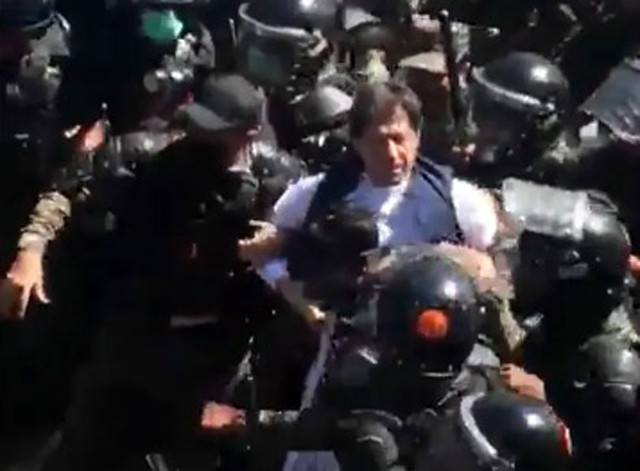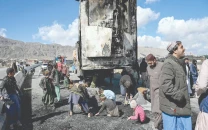How international media covered Imran Khan’s arrest
Former prime minister’s dramatic arrest sends shockwaves, sparks international concerns

Former prime minister and Pakistan Tehreek-e-Insaf (PTI) Chairman Imran Khan's dramatic arrest by Rangers paramilitary force at the Islamabad High Court on Tuesday has not only shaken Pakistan but also garnered international attention.
Media outlets around the world are highlighting the potential consequences of Khan's arrest, painting a picture of escalating tensions between Khan and the civil-military leadership, as well as the implications for Pakistan's political landscape and international relationships.
Time reported on the arrest as a catalyst for potential friction between Khan and the country's civilian and military leadership.
Paramilitary troops arrested Khan on the orders of the anti-corruption bureau.
— TIME (@TIME) May 9, 2023
The development threatens to escalate the nation's political crisis and draw thousands of his supporters to the streets https://t.co/dIMPwbT3N6
Michael Kugelman, director of the South Asia Institute at the Washington-based Wilson Center, stated that the arrest represents a significant escalation in the long-standing confrontation between Khan and the power structures in Pakistan.
Kugelman suggested that the military likely played a direct role in Khan's arrest, with possible support from the civilian leadership, given their acrimonious relationship with the former prime minister.
The New York Times framed Khan's arrest as part of an ongoing confrontation between him and the military establishment, portraying Khan as an existential threat from the military's perspective.
Breaking News: Former Prime Minister Imran Khan of Pakistan was arrested by paramilitary troops in a major escalation of a political crisis. https://t.co/7vcPNVcjks
— The New York Times (@nytimes) May 9, 2023
Meanwhile, Reuters highlighted Khan's popularity, referring to him as "Pakistan's most popular leader" according to opinion polls, and connected his arrest to the power struggle between the former prime minister and the armed forces of Pakistan.
Supporters of Imran Khan called for protests after Pakistan’s former prime minister was arrested in Islamabad. The arrest comes at a time when ordinary Pakistanis are reeling from the worst economic crisis in decades, with record high inflation https://t.co/9fbbDMv7Da pic.twitter.com/ZvxMexnr3d
— Reuters (@Reuters) May 9, 2023
CNN depicted a scene of chaos, reporting that paramilitary forces forcefully entered the Islamabad High Court premises and arrested Khan while he was submitting his biometric data for a court appearance. They broke a window to apprehend him, leaving a dramatic image of the incident.
Former Pakistan Prime Minister Imran Khan has been arrested by paramilitary troops in Islamabad on charges brought by the country’s anti-corruption agency, according to court documents seen CNN https://t.co/hAXsvekR5A
— CNN (@CNN) May 9, 2023
The Guardian labeled Imran Khan as "the most divisive man in Pakistan" and traced the deteriorating relationship between Khan and the military to cracks that began to emerge in 2021.
The report highlighted Khan's resistance to what he perceived as control by the military and the government's declining economic situation. The Guardian also suggested that Khan's enduring popularity, evident in the immediate protests following his arrest, poses a threat to the current government, leading to calls for early general elections.
Also read: Imran Khan’s dramatic arrest at IHC triggers countrywide protests
The international coverage of Imran Khan's arrest reflects concerns over the deepening divide between Khan and the civil-military leadership, potential unrest, public fury, and its impact on Pakistan's bilateral relationships.
As the situation continues to unfold, the international community is closely watching how these developments could shape Pakistan's political future and its relationships with key partners like China, the United Sates and the International Monetary Fund.



















COMMENTS
Comments are moderated and generally will be posted if they are on-topic and not abusive.
For more information, please see our Comments FAQ